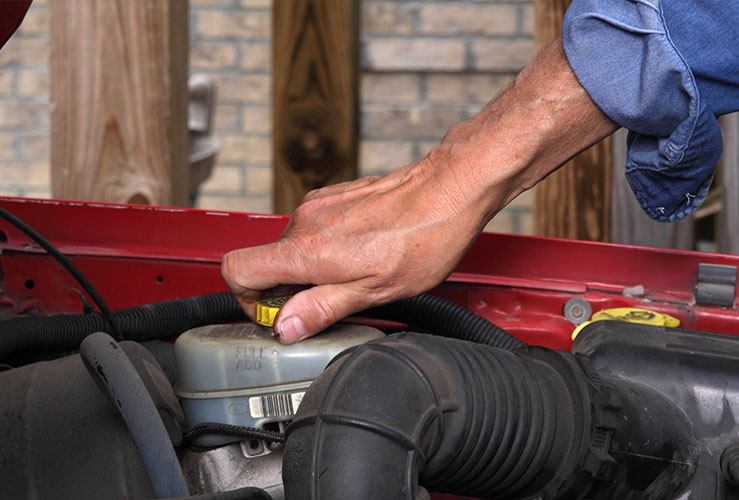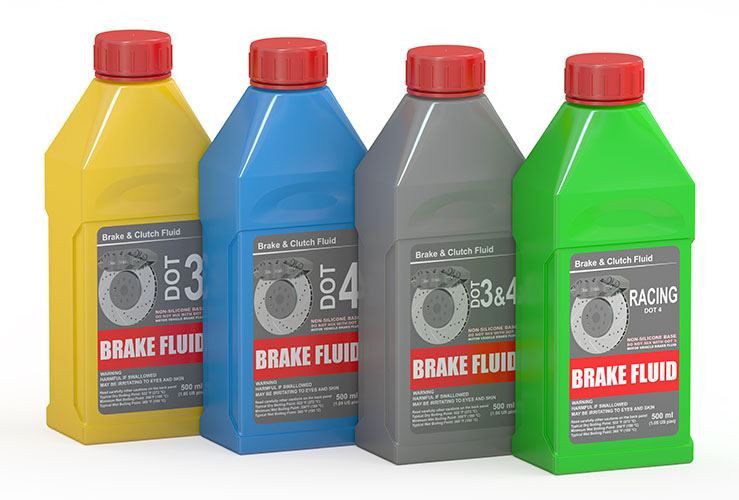What is brake fluid and what does brake fluid do?
Brake fluid - sometimes known as hydraulic fluid - is crucial for moving parts of your braking system.
This fluid works under very high pressure and, assuming it is not contaminated, will not corrode internal components.
Without break fluid, you would quite simply be unable to brake.
Brake fluid cannot be compressed. When you press your brake pedal a piston inside the brake caliper is compressed, which forces the brake fluid into motion.
The pressure from the brake fluid squeezes the brake rotors down onto the brake pads, which in turn make contact with the wheels - causing your vehicle to slow and then stop.
Check how your breaks are performing with our guide here.
Note: You should always check your vehicle handbook for any fault remedy before carrying out any work on your vehicle. If you are unsure of what is required to fix any problems, please consult a professional.

How often do you need to replace brake fluid?
It's important to flush and replace brake fluid to ensure your vehicle’s braking system works at an optimal level. A break fluid change should be done every 24 months - or per 24,000 miles travelled - whichever is sooner.
Break fluid service
It is possible to accomplish this task yourself, but your garage will have a proper brake flushing system.
A brake fluid change service is relatively inexpensive in comparison to other vehicle repairs and servicing requirements. Expect to pay around £30 - £50 for a car brake fluid change in the UK.
Break fluid fill level
If you have a brake fluid leak, or flush your braking system, you'll need to refill your brake fluid cylinder to the marked ‘fill’ level.
What is the best brake fluid to use?

It's worth investing in a high quality brake fluid. There are three main types available today, called D.O.T. 3, D.O.T. 4 and D.O.T. 5.
3 and 4 are the most common, but 5 is now widely available too.
The main advantage to D.O.T . 5 is that it doesn't corrode paint or absorb moisture. Consequently, D.O.T. 5 can lead to pools of water building up in your braking system.
Contaminated brake fluid: How does brake fluid get contaminated?
Brake fluid is quickly contaminated by contact with air. Oxygen oxidizes the fluid and lowers the boiling point.
Moisture can also cause problems with braking fluid; crystals can form making braking less effective.
Any water in your brake fluid can lead to internal rust which can make braking more difficult - or even stop your brakes from working altogether. Anti-lock Braking System (ABS) components can also be damaged by fluid contaminated by water.
How to avoid brake fluid contamination?
If you decide to top up your own brake fluid it's a good idea to only buy a small bottle to avoid brake fluid contamination.
Fill up your brake fluid cylinder then throw the remainder away - because as soon as air comes into contact with the fluid it will become contaminated. This is the case even if you put the cap back on very quickly.
How to change brake fluid yourself
To change brake fluid yourself:
- Remove the old fluid from the cylinder. You can use an old turkey baster for this task.
- Clean out the reservoir with a clean, lint-free cloth. This is only possible if you can access it.
- Pour new brake fluid into the cylinder - up to the ‘fill’ line - taking care to replace the cap.
Does your car judder when you break? Read here for reasons why.





